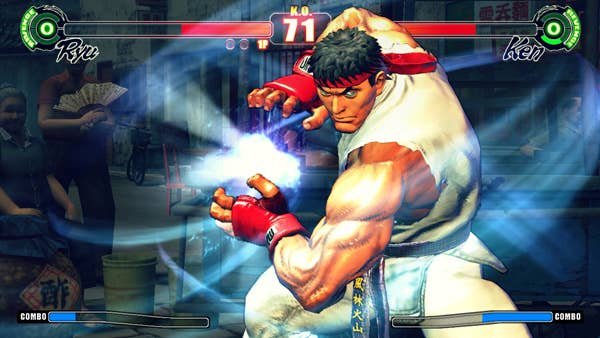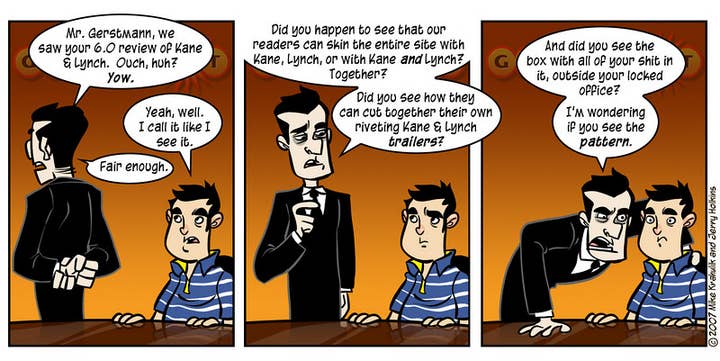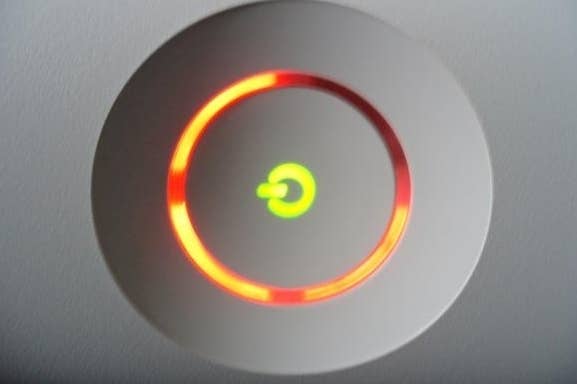Entitled Gamers, Corrupt Press, and Greedy Publishers
Something's broken in the way we deal with each other, but there are understandable reasons why
The Game Developers Conference kicks off next week, and lately when I haven't been busy planning coverage for the 2013 show, I've often found myself thinking back to GDC 2012. Specifically, I've been reconsidering a Chris Hecker mini-rant titled "The Dysfunctional Three-Way" in reference to gamers, developers, and the press. But where Hecker focused on a symptom of the dysfunction--an "appetite for sameness" in content the industry creates, covers, and consumes--I've been pondering the root cause. The problem between players, developers, and the press is partly that they just don't respect one another, and partly that they have justifiable reasons not to.
You might have noticed things in the world of core gaming have changed as this generation has dragged on. They're a little more tense, a little more antagonistic than in the past. The relationships between the people who make the games, the people who play the games, and the people who write about the games are increasingly strained, and the general attitude each group has toward the others creates a caustic, almost toxic atmosphere. This is an industry traditionally defined by its single-minded pursuit of fun, but these days it seems content to sit back and wallow in acrimony.

Gamers are mad because they're treated with naked contempt by the people who count them as customers. They're angry when their media outlets serve the interests of their advertisers instead of the interests of their readers. Or when the long-standing practice of buying and selling used games is suddenly tantamount to thievery just because technology has given content creators a way to throttle it. And who wouldn't be upset after paying $60 for a brand new game only to find out it isn't actually playable because the publisher imposed a needless DRM scheme even though they were woefully, incompetently unprepared to fulfill their obligation of providing servers for it? Should we even begin to get into increasingly exploitive business models that are driven by nothing but a remorseless push to separate gamers from their money?
"When even the best work brings with it a measure of abuse, it becomes difficult to filter out the unreasonable complaints from the ones that actually have a really good point."
That said, players don't have a monopoly on righteous indignation; press, developers, and publishers have a few reasons for resenting their audiences right back. The gaming public is a bottomless well of wanting, and whatever they are given, a not insignificant number of them will be vocally unhappy. They are upset that not enough was changed for the sequel. They are upset that too much was changed. All post-release content should be free. It's okay to vote with your wallet by pirating a game, because the company who made it is evil and what else are you expected to do? Not play it? This review score was too high; they must have been bought off. That review score was too low; I bet the incompetent and/or lazy reviewer didn't even beat the game on Master Ninja difficulty. "These websites have no standards and post sensationalist click-baiting tripe," they yell before clicking on the headline screaming "BREAKING: Miyamoto BLASTS rumored Xbox 720 specs!"
When people squat on absolutely everything, when even the best work brings with it a measure of abuse, it becomes difficult to filter out the unreasonable complaints from the ones that actually have a really good point. That becomes even harder when the wonder of Internet anonymity empowers them to abandon all pretense of civility, and so much of the gaming world seems primed to give voice to the nastiest aspects of their personalities. Remember the unconscionable bullying BioWare's Jennifer Hepler faced when she dared to suggest story-driven games could let players skip through combat sequence? How about when high-level Street Fighter x Tekken player Aris Bakhtanians defended sexual harassment in the fighting game community as "part of the culture" (and had more than a handful of people coming to his defense)?

The game makers and the press haven't had a great relationship of late, either. Some of the problems are the same as ever, but both the gaming industry and the press that covers it are going through some pretty lean times, and the pervasive sense that there's a hair's breadth between treading water and sinking like a stone is only heightening the tension. When coverage drifts away from what the publisher considers "on message," access can disappear. People lie about what problems will be fixed for launch, or whether so-and-so is doing interviews at an upcoming event. They complain when comment is not sought, but routinely ignore requests or stall for days when it is. Of course, those requests might be made a minute before the story goes live anyway, not exactly providing anyone with a fair opportunity to respond. And there's no shortage of writers willing to view every action in the worst possible light, to make out-of-context remarks into headlines or run with scintillating scuttlebutt, no matter how flimsy or far removed from reality it actually is.
"We have three groups of people, each of which has entirely legitimate reasons to show distrust and disdain toward the other two."
The sum of all this is that we have three groups of people, each of which has entirely legitimate reasons to show distrust and disdain toward the other two. And the state of the industry at this particular point in time is only making the situation worse.
The Internet has matured to the point where everybody has a voice, and the barriers separating the voice of the well-informed from the probably insane have never been lower. The media and the industry have no choice but to filter out a certain amount of the criticism as online background noise. And when we can point to hard numbers like "unique visitors" or "average revenue per user" as evidence that people actually like what we're doing, it's no wonder that the actual, legitimate complaints about our behavior fall on deaf ears. If we're running businesses, the complaints have to be ignored, at a point.
Meanwhile, the players are losing control of their hobby in new and frightening ways. "Games as a service" means no more "games as a tangible product," which means no more owning games as a finished thing that they can slot into a collection and preserve for all time. Now games are only as good as the servers they run on (the less said about that, the better), and the idea of a complete, cohesive gaming experience seems to be losing ground to the notion of a virtual treadmill which requires constant investment--or at least constant engagement--to maintain. Games are becoming less a hobby than a second job.

And the press is caught in the middle. As has been the case for centuries, focusing on that which will be read is more lucrative than focusing on that which will best serve or inform readers. But the margins for error are slimmer than ever before. Just ask anyone who has worked for and been laid off by Ziff Davis before (and let's jokingly assume that's a majority of the game journo population at this point). This is an insecure profession, and today's Internet darling could be today's unemployed writer, never mind tomorrow. The pressure to make sure that every story gets hits, that every feature goes viral, has never been higher. If it reflects poorly on something with a well-established fanbase that will protest in abundance, it leads.
"As has been the case for centuries, focusing on that which will be read is more lucrative than focusing on that which will best serve or inform readers. But the margins for error are slimmer than ever before."
There are exceptions to every one of these rules. Obviously, there are plenty of reasonable gamers who ask for entirely achievable things that the press and game makers should provide as a matter of principle, or at least policy. And there are a number of developers and publishers who do treat their fans with respect, who provide a fair exchange of content for currency, and take user feedback to heart. And hopefully everyone involved has a handful of favorites on the journalism side, people they trust to give them an honest opinion or an even-handed report instead of pandering to the interests of others. But these are still exceptions because we treat praise as a finite resource, doling it out in miserly fashion to a single person here or a rare company there. On the other hand, we have scorn in abundance, and we direct it at even deserving targets with all the careful precision of a carpet bombing. Whoever gets caught up in the collateral damage probably deserved it anyway, right?
For each of these groups, the default state toward the others is almost necessarily distrust. We cannot extend each other the basic respect we should, simply because the negative consequences of doing so in those cases when we shouldn't are too high, and those cases are too common.
Because getting back to Hecker's GDC speech, the traditional gaming industry as it currently operates is dysfunctional. And if we're going to change that, we have two options. The first is to wait until the industry's financial fortunes improve, alleviating the pressures on the press and the game makers and (hopefully) giving people the luxury of breathing room. (Given the number of AAA-naysayers, let's assume this improvement is not imminent.) The other option is to empathize with each other, to assume people are deserving of respect, to give someone the benefit of the doubt. I can't say which party should extend that courtesy first, and I can't fault those who wait for someone else to make the first move, but it must happen at some point if we want to fix the problem.

